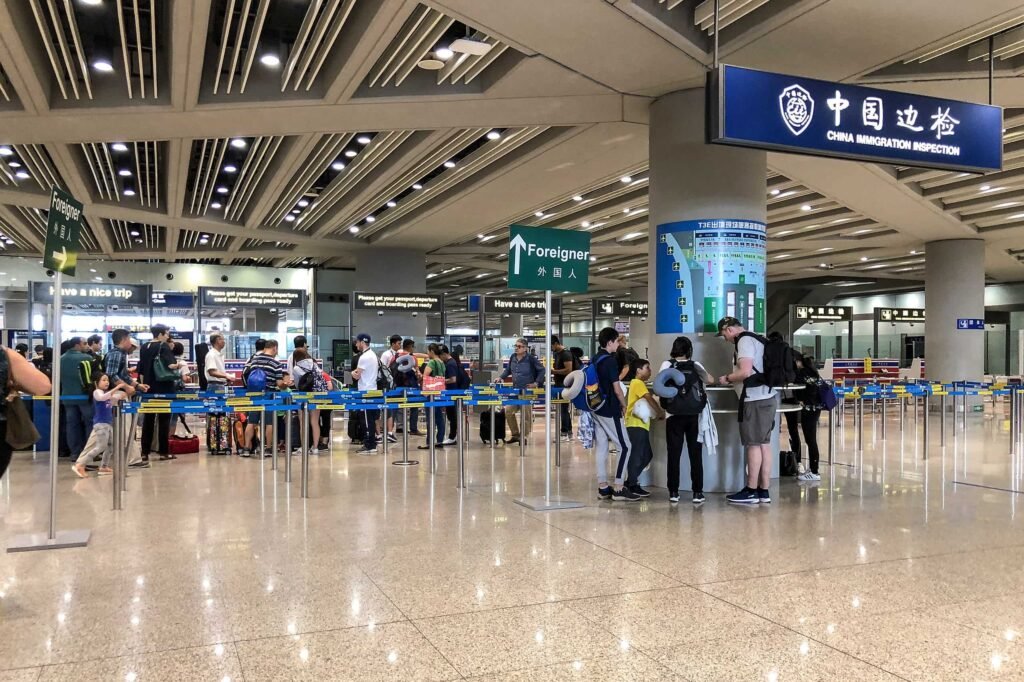Upon arriving in China, you are required to register your place of residence with the local police station within 24 hours if you're not staying at a hotel that offers registration services. To do this, you'll need to bring your valid passport or other international travel documents, along with the rental contract or property rights certificate for your accommodation. This process ensures you comply with Chinese immigration requirements and maintain a legal status during your stay.
The process for obtaining a work permit in China involves several steps and documentation. Firstly, you'll need a job offer from a Chinese employer. Your employer will assist you in applying for a Notification Letter for Foreigner's Work Permit, which you'll obtain from the Chinese embassy or consulate in your home country. Once you arrive in China with a Z visa, you must apply for a Foreigner's Work Permit within 30 days from the date of entry. This application is typically done online and requires documents such as your passport, highest academic degree (diploma), professional qualification certificates, a certificate of no criminal record, and a physical health examination certificate. Your employer will submit the application to the administration department for foreigners working in China.
Opening a bank account in China as a foreigner involves visiting a commercial bank with your passport or Foreign Permanent Resident ID Card and a mobile phone number registered in China. You'll be required to fill in an account opening application form and set up a password for your new bank card at an ATM. It's advisable to download the mobile banking app of the corresponding bank for convenience. After receiving your bank card, ensure you keep it secure and report any loss to the bank immediately. Some banks may have additional requirements, so it's best to consult with the bank's customer service before proceeding.
China’s dynamic business landscape presents a world of opportunities for business expatriates. However, the transition can be challenging due to cultural, legal, and linguistic differences. This comprehensive guide is designed to provide you with the knowledge and tools necessary to not only adapt but thrive in your new environment. We’ve covered everything from the initial legal requirements to long-term career and lifestyle considerations, ensuring you’re well-equipped to make the most of your China experience.

Understanding the Residence Registration Process:
Upon arrival in China, foreign nationals are required to register their place of residence within 24 hours. This can be done online or in person at the local police station. The process involves presenting your passport and proof of accommodation, such as a rental agreement or hotel receipt.
Visa Types and Requirements for Expatriates:
Different visa types cater to various activities. The M visa is for those engaging in commercial trade activities, while the Z visa is designated for work purposes. Each visa type has specific requirements, such as an invitation letter or a work permit, which must be meticulously fulfilled.
Applying for a Residence Permit:
A residence permit is essential for stays exceeding 90 days. The application process involves submitting your passport, a visa, a health check certificate, and an invitation letter from your employer or a Chinese sponsor. It’s crucial to apply for extensions or updates to your permit to avoid legal complications.

Getting a SIM Card: To stay connected, you can purchase a SIM card from one of China’s major carriers. You’ll need your passport and a recent photo for registration. Consider the data packages and international call rates when choosing a plan.
Opening a Bank Account: Opening a bank account in China requires your passport, residence permit, and proof of local employment or residence. Major international banks, as well as local banks, offer a range of services tailored to expatriates.
Navigating China’s Transportation Network: China’s extensive transportation network includes high-speed trains, buses, and metros. For train travel, you can book tickets online through the 12306 website or app. For local transport, consider using mobile payment apps like Alipay or WeChat for convenience.
Finding Accommodation: When searching for accommodation, consider factors like proximity to work, local amenities, and safety. Serviced apartments are a popular choice for expats, offering furnished units and additional services. Long-term leases typically require a security deposit and several months’ rent in advance.

Visa Extension: Visa extensions can be applied for at the local Exit and Entry Administration Bureau. You’ll need to provide your passport, residence permit, and a completed application form. It’s advisable to apply at least one month before your visa expires to avoid penalties.
More Detail : China Visa Info
Residence Permit Renewal: Renewing your residence permit involves similar documentation to the initial application. Ensure all your documents are up-to-date, and your employer’s information is accurate. Renewals can be done online or in person.
Work Permit Application Process for Expats:
The work permit application requires a thorough understanding of the points-based system used in China. You’ll need to submit documents like your diploma, professional资格证书 (qualification certificate), and a health certificate. Your employer will assist with the application, which is typically done online.
Understanding Your Employment Rights in China:
Familiarize yourself with the Chinese Labor Law, which outlines rights such as paid leave, working hours, and termination conditions. It’s also important to understand any additional benefits provided by your employer.
Social Insurance in China:
China’s social insurance system includes five categories: pension, medical, unemployment, work-related injury, and maternity insurance. As an expat, you’re required to contribute to these programs, which offer various benefits in return.
A Guide to Individual Income Tax for Expats:
Understanding China’s individual income tax system is crucial. Tax residents are liable for tax on their global income, while non-residents are taxed only on Chinese-source income. The tax rates vary depending on the individual’s tax residency status and income level.
Maximizing Tax Treaties:
Tax treaties between China and many countries can reduce double taxation. Expats should review these treaties to understand any tax relief or exemptions they may qualify for. Proper documentation, such as tax residency certificates, is often required to claim these benefits.

Understanding Chinese Business Etiquette:
Chinese business culture places a strong emphasis on relationship-building (关系, guanxi). Understanding the nuances of gift-giving, exchanging business cards, and the importance of face (面子, mianzi) can significantly impact your business dealings.
Relocating to China:
Relocating to China involves more than just finding a place to live. Consider factors like school options for your children, adapting to the local climate, and understanding the healthcare system. Our guide provides a comprehensive overview of these considerations and more.
Networking and Building Relationships in China:
Networking is vital for both personal and professional growth. Joining expat groups, attending industry events, and participating in local activities can help you build a robust network. Remember, maintaining these relationships is just as important as forming them.
Your journey as a business expatriate in China is not just a professional endeavor but also a cultural immersion. By leveraging this guide and its resources, you can navigate the complexities of your new environment with confidence. Whether you’re just starting your adventure or looking to enhance your existing experience, this guide is here to support you every step of the way.
Official Source : http://images.mofcom.gov.cn/wzs/202403/20240306153128529.pdf

Travel China. All Rights Reserved.